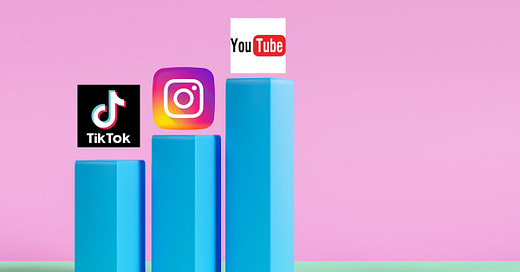
TikTok needs Taylor Swift more than Taylor Swift needs TikTok
PLUS: Not even the cable companies care all that much that the cable bundle is shrinking.
Welcome! I'm Simon Owens and this is my media industry newsletter. If you've received it, then you either subscribed or someone forwarded it to you.
If you fit into the latter camp and want to subscribe, then you can click on this handy little button:
Let’s jump into it…
TikTok needs Taylor Swift more than Taylor Swift needs TikTok
I don’t think I’ve ever mentioned this in the newsletter before, but I used to be a short fiction writer. Not only was I somewhat prolific in producing new stories, but I was also disciplined about submitting and selling them to magazines. I even managed to get a story of mine reprinted in a “best of” anthology alongside some famous writers you’ve definitely heard of.
Now, the short fiction market was never a lucrative one — I think the most I ever made in a sale was $200 — but there was still a baseline assumption within the writing community I hung out in that authors deserved some kind of compensation for their work. That’s why it was common for us to mock online magazines that proudly touted in their submission guidelines that they paid in “exposure.” What made that claim especially funny was that these publications almost certainly had non-existent audiences, which rendered their form of “compensation” all the more ludicrous. Let’s just say I doubt they were minting the next generation of John Grishams or Stephen Kings with their free exposure.
I was reminded of these magazines when reading about the ongoing fight between TikTok and Universal Music Group, the latter of which has pulled its entire music catalog from the former in an effort to negotiate better rates for its musicians. In public statement after statement, TikTok painted itself as the victim: “Despite Universal's false narrative and rhetoric, the fact is they have chosen to walk away from the powerful support of a platform with well over a billion users that serves as a free promotional and discovery vehicle for their talent,” they wrote.
A “free promotional and discovery vehicle for their talent”! Doesn’t UMG understand that TikTok was paying its artists with exposure?!?
In 2014, that statement may have drawn some sympathy, but in 2024? We’re now living in an era in which online streaming generates the vast majority of the music industry’s revenue, and absolutely no one is buying the notion that exposure alone is a fair exchange of compensation.
Ironically, TikTok would have more of a leg to stand on if it had simply kept to its original video length restrictions. It’s easier to argue that you’re not cannibalizing music streaming when the maximum length of a video is just 15 seconds. But now that video length has been expanded to 30 minutes — with a full 60 seconds allotted for copyrighted music — its “free exposure” claim just doesn’t pass muster.
What’s more, TikTok is especially vulnerable now that it has plenty of competition nipping at its heels. While Instagram Reels had a wobbly launch — it wasn’t that long ago when I regularly ranted on social media about how it had ruined the Instagram experience — even I have to admit that the algorithm is doing a fairly decent job now of surfacing entertaining videos. It also probably doesn’t hurt that Meta is reportedly paying at least twice as much as TikTok to the major music labels.
But the real elephant in the room is YouTube Shorts. Since launching in 2020, it’s posted massive growth numbers, and unlike TikTok, which pays for music rights in a lump sum, YouTube Shorts has a robust and structured revenue sharing policy. Even better, YouTube Shorts feeds into the wider YouTube ecosystem, which has gradually become a massive contributor to the music streaming market. In its recent earnings call, YouTube announced it’s surpassed 100 million paid subscribers for YouTube Music and other services, and that it’s paid out “$70 billion to creators, artists and media companies over the last three years.” A substantial portion of that $70 billion likely went to the music industry.
This isn’t the first time TikTok has been accused of undervaluing content creators. The YouTuber Hank Green famously kicked off a round of criticism about the platform’s pathetic “creator fund,” which eventually led to TikTok slowly rolling out a more robust revenue sharing program.
Ultimately, I think TikTok will blink first in its fight with UMG, especially once the company triggers the “nuclear option” and removes all songs covered by its publishing division. While some artists have complained that they can no longer promote their songs on TikTok, there are other massive distribution platforms ready to step in and pick up the slack. Whatever first mover advantage TikTok had in the vertical video space, it’s now long gone.
What do you think?
Want to reach my audience?
My newsletter has an open rate well north of 40% and is read by many of the top executives in tech, media, and marketing. If you want to reach this audience, then check out my sponsorship page.
Quick hits
An anonymous Substack writer has built an influential following in Washington, DC with their data-heavy crime reporting. [WCP]
INTERESTING: A bunch of UK publishers teamed up a few years ago to launch an ad tech platform. "Its solution delivers between three and five times what publishers would receive selling advertising on the open web." [Press Gazette]
"In essence, Forbes today is NerdWallet plus Wirecutter plus brand extensions, but with the imprimatur of a legacy media brand that was once synonymous with wealth ... It’s a beast that the Forbes family may have never imagined, but the pivot to services and e-commerce at least aligned with the broader shifts in digital marketing. Unlike many of its midsized media peers, it still makes good money." [Puck]
It’s 15 years after its launch and Spotify is still posting massive growth numbers. My guess is that its expansion into podcasts and audiobooks helped fuel that growth. [Variety]
Bluesky is opening to the masses today. I have an account there if you want to follow me: [Simon Owens]
Want to pick my brain on your content strategy?
Are you contemplating a new content strategy and want someone to give you feedback? I’ve had more and more of my readers reach out and request consulting calls so they can pick my brain on a variety of issues, including platform optimization, content strategy, and monetization.
You can now book a call with me directly through Substack. Use the link below to grab a time on my calendar:

Book a meeting with Simon Owens
More quick hits
Quora represents the end stage of the web's enshittification cycle: a once-useful website that's been rendered almost completely unusable in its quest for infinite scale. [Slate]
Why jello used to be a luxury food. [Momentary Experts]
"Pitchfork and Ars Technica, two of the smallest brands in the Condé portfolio, often vie for first and second place among homepage traffic, far outpacing glossier brands like Vogue and GQ." [Semafor]
Kevin Kelly's "1,000 true fans" theory gained so much recognition because of the optimistic view it espoused on creator economics. But any creator who's tried to put the theory into practice can tell you it's incredibly difficult to find 1,000 true fans. [Joan Westenberg]
Not even the cable companies care all that much that the cable bundle is shrinking: "Companies barely make any money from their pay-TV units these days, analysts said, and most have long shifted their focus to their lucrative broadband businesses. Both Comcast and Charter have more than twice as many broadband subscribers than they have pay-TV customers, and their broadband revenue is still getting larger." [WSJ]
Want a daily dose of media industry news?
I only send this newsletter out twice a week, but I curate industry news on a daily basis. Follow me on one of these social platforms if you want your daily fix:















Local media startups should take a hint from the popularity of on-screen police procedurals and not neglect cop-shop material.